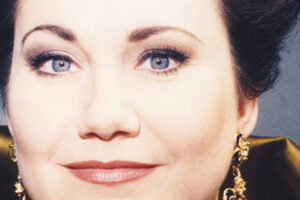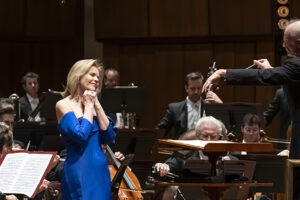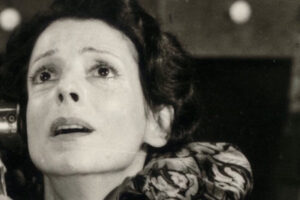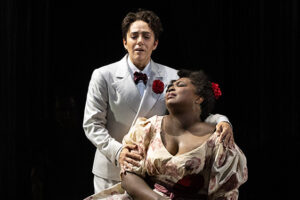

La Cieca: Welcome to New York! We don’t get to see you much here: do you have further plans in the city?
Rinat Shaham: Well I’ve already made my debut at “The Monster”, I hope for further engagements! But seriously I’d love to work (sometimes) from home, I’d love to have my gay entourage witness how more and more I sound like Liza, and look like Margaret Cho, but it’s just not happening. Between not having made it to the Met and City Opera being dead (or whatever) I can only hope for an interesting invitation from just about anybody else in the city, with good ideas and a vision (and some kind of a budget).
LC: So how much is “The Sorrows of Young Werther” like the Massenet Werther? How much Goethe do we need to know to enjoy it?
RS: “The Sorrows of Young Werther” is a focused, very intense look at the psychological breakdown of Werther, and a journey through the mind of a young man who has been completely undone by obsessive love. In this sense, it bypasses many of the purely external features of Massenet’s opera in order to concentrate solely on the inner life of the protagonist. Also, because this is a theatrical concert, in which the drama alternates with a full musical program, the time allocated to the narrative script is dependent on the music as well. There is no need to know Goethe specifically in order to enjoy the program, because the story is universal. As Goethe himself said later in his life, everyone goes through a “Werther” phase in life, when we are completely and insanely overtaken by the object of our love and desire.
LC: In this piece, are you Charlotte specifically, or how exactly do you fit in?
RS: The script calls for a single actor who plays Werther. All the musicians (the two singers and two pianists) interact with Werther and, on a very profound level, may be stand-ins for Werther’s experiences and relationship with Charlotte and her fiancé Albert. In this sense, the musical program functions as a musical version of Werther’s tumultuous experiences. In my part, as I sing the several songs by different composers interspersed with Schumann’s song cycle Dichterliebe. I represent not only Charlotte, the love object of Werther, but also the love object of the unnamed young man depicted in Schumann’s Dichterliebe. There are multiple levels of association and symbolism in the way the musicians and the actor interact, many of which will be made clear through the staging, lighting, stage props, etc. It is an intense, multilayered, and highly evocative production.
LC: More broadly, in your career, you sing Carmen a lot, practically everywhere. Do you ever get tired of her? Is there something special about this part that keeps her fresh?
RS: Carmen is fresh, trust me! It’s just the dust you need to clear off when you recreate that show. The better the production is, the fresher you’ll get out of me. But it’s always great fun stepping into her shoes, no matter what. What’s so special about it for me, is that I can corporate a few different sides of myself that I don’t necessarily live out, and be that. And it’s not like the Halloween fun of being dressed up and feeling out-of-body sexy for that one night in the year; it’s an entire kaleidoscope of possibilities with this character.
The mixture of vulnerability and strength and pretend-strength is what I especially love. Being so familiar with the piece only gives me more urgent need and the freedom to find the news in it. I love it when a director, conductor or a colleague can get me surprised. I am trying with all my power to do other roles, but as long as my cleavage is more or less up and my vibrato is not wider than a major third, I wouldn’t mind sprinkling my life with Carmens until it’s simply not hirable anymore.
LC: In the last few seasons you’ve been directed by Krzysztof Warlikowski and Stefan Herheim (among others) and this fall you collaborate with Calixto Bieito on Forza at the ENO. Is there a secret to making the most of the experience of working with a conceptual or avant-garde director? Do you have a dream director/conductor/work combination?
RS: I still haven’t worked with Bieto, but I can tell you what Herheim and Warlikowski have in common: they need singers to get into the character like never before, and really bring to the table the maximum they can. You must be flexible, creative, and very open in order to even understand what they need from you. Both of them pushed me to the edge of my ability.
What in a routine production I just kinda swing, they immediately stopped in its tracks. They forbade me from being boring (which is so easy to be when you are used to doing the same things over and over again with no real direction). They explored my range as an actress and they pinpointed my strength and then worked with it. And they demanded creativity, real abundant creativity, in a way you don’t often get from an opera director. With both of them, the process of rehearsing was almost life-changing.
The audience might love or hate or not get the result, but you can’t argue that it’s in any way forgettable. It certainly is not to me. I wish I had the chance to work like this more often.
A really interesting combo would be Herheim and Currentzis. That would be something else. Any genius director could create great collaboration with a genius conductor, but they must have matching sensibilities. Herheim is a musician too and works almost like a choreographer in consideration of the music, so hopefully there shouldn’t be any ego/priority clashes if he ever works with Currentzis, who is insanely brilliant and brilliantly insane, and something really good can come out of it. I’d give a lot to be in that production, whatever it would be.
[“The Sorrows of Young Werther” plays Wednesday and Thursday of this week at Symphony Space.]
























Comments